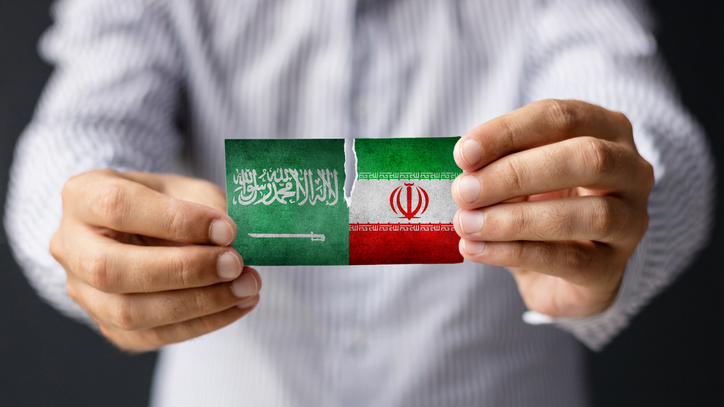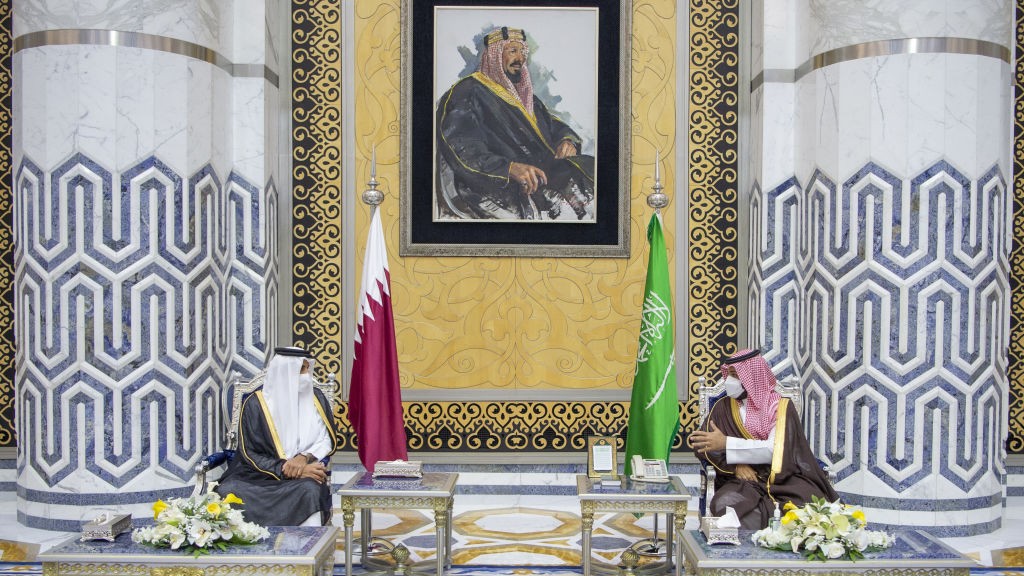
A man holding Saudi Arabian and Iranian national flags. /Getty
A man holding Saudi Arabian and Iranian national flags. /Getty
Editor's note: Guy Burton is an adjunct professor at Vesalius College, Brussels. The article reflects the author's opinions, and not necessarily the views of CGTN.
Over the past two months it has become clear that Saudi Arabian and Iranian officials have been meeting and talking with each other. Initially the talks were denied when the news first broke at the beginning of April. But by the end of the month, Saudi Crown Prince Mohammed bin Salman (MBS) said during an interview on state television that he was keen to see better relations between the two countries.
MBS's statement served as a green light. Since then there has been greater frankness that the two sides are meeting. That they are doing so is significant, given the longstanding rivalry between the two countries and the absence of diplomatic relations since their ambassadors were recalled five years ago.
Dialogue between Saudi Arabia and Iran is welcome, although it is not clear what results – if any – have so far been achieved. But what prompted the start of talks in the first place and where might they lead?
Perhaps the simplest explanation put forward is the change in international climate, in particular the presidential change in the U.S. at the start of the year. For the Saudis the change was particularly stark since they lost an extremely close partner in the White House after Joe Biden took over from Donald Trump.
Although the U.S. and Saudi Arabia are close allies, Trump was especially close. Trump was a strong supporter of MBS and turned a blind eye to his behavior, including his reported involvement in the murder of Saudi journalist Jamal Khashoggi.
His strong support for the Saudis was matched with a fierce opposition to Iran. He criticized the nuclear deal with Iran as a bad one and pulled the U.S. out of it in 2018. In doing so, he reintroduced sanctions and imposed additional ones. However, Trump's "maximum pressure" strategy has largely failed; although Iran's economy has been squeezed by sanctions, it has loosened its commitments to the deal by increasing production and stockpiles of nuclear material.
In contrast to Trump, Biden has indicated that he is prepared to have a more distant relationship with the Saudis. In February, he released the Central Intelligence Agency (CIA) report which concluded that MBS was behind the Khashoggi killing, but he stopped short of sanctioning him personally. He has also indicated a keenness to reverse Trump's Iran policy: American officials are currently engaged in indirect talks with Iran to bring it back into compliance with the nuclear deal and effectively make the U.S. a signatory again.
Although appealing, this U.S.-centric explanation for the change in tone between the Saudis and the Iranians is insufficient. Trump was not as reliable a partner as he appeared. Perhaps the most recent example of this was his reaction to the drone attack which damaged Saudi Arabia's oil production and refining facilities at Abqaiq and Khurais in September 2019.
The attack was attributed to the Houthis, an Islamist group in the north of Yemen whom the Saudis are currently fighting and who have previously received Iranian financial and material support. The assault was significant for two reasons. As well as knocking out half of the country's oil production, the Saudis were disappointed to see Trump back away from earlier promises to provide more direct support, including military. Since then, the Houthis have continued their attacks on Saudi oil installations on a regular basis, even if they have not had as spectacular an outcome as at Abqaiq.

Emir of Qatar Sheikh Tamim bin Hamad al-Thani (L) is welcomed by Saudi Arabian Crown Prince Mohammed bin Salman at King Abdulaziz International Airport in Jeddah, Saudi Arabia, May 11, 2021. /Getty
Emir of Qatar Sheikh Tamim bin Hamad al-Thani (L) is welcomed by Saudi Arabian Crown Prince Mohammed bin Salman at King Abdulaziz International Airport in Jeddah, Saudi Arabia, May 11, 2021. /Getty
In addition, Trump may well have contributed to Saudi (and UAE) miscalculations that led to the Gulf crisis with Qatar in 2017. According to Kristian Ulrichsen, a researcher on Gulf politics at Rice University, the Saudis and Emiratis cultivated Trump and his team after his election in 2016 and during his early months as president. They believed they had him in their pocket when they imposed their blockade on Qatar, which they saw as a disruptive and unreliable regional state.
Unfortunately for them, Trump subsequently stepped back and adopted a more neutral stance between the two sides. The Saudis and the UAE maintained their diplomatic and economic boycott of Qatar during which time Doha's relations with Iran advanced – much to Saudi and Emirati consternation. At the beginning of this year they changed tack and abandoned the blockade.
Looking beyond the U.S., there are also relevant regional and domestic reasons for both Saudi Arabia and Iran to want better relations with each other. According to the Iraqi officials who hosted the most recent round of talks, Iran hopes that an improvement in relations with Saudi Arabia will help it sell oil on world markets. In exchange for putting pressure on the Houthis to hold back on attacking Saudi Arabia, Iran wants Saudi Arabia to buy its oil at prices below the market rate, which can then be sold internationally and thereby diminishing the impact of sanctions against it.
Iran's need for income was masked by its defiant stance towards American pressure in recent years. At the same time, the Saudis may have concluded that talking to Iran may be worthwhile now because it is not as threatening as it once was. Additionally, a settlement that defuses tensions would be welcome for Saudi Arabia's public finances.
Saudi Arabia is the region's largest spender on military equipment. In 2019, it spent nearly 8 percent of GDP on weapons. Spending on weapons means less money available for other areas, including economic diversification. Like the other Gulf states reliant on oil and gas production and exports, the Saudis realize they need to transform their economy now in order to be ready for a global economy that is less reliant on fossil fuels in the future. To do that, investments need to be made. But that may prove to be difficult if the current low price for oil continues, leading to less revenue over time alongside pressure to maintain current levels of spending and citizen demand for generous public services.
Looking ahead, if Saudi Arabia and Iran are able to find an accord, it may well be that it was due more to these challenges and pressures closer to home than any change in Washington. Moreover, if that is indeed the case, then it means that an agreement would be more promising in its durability, since there would be sufficient domestic demand to make sure that it works and lasts.
(If you want to contribute and have specific expertise, please contact us at opinions@cgtn.com.)

